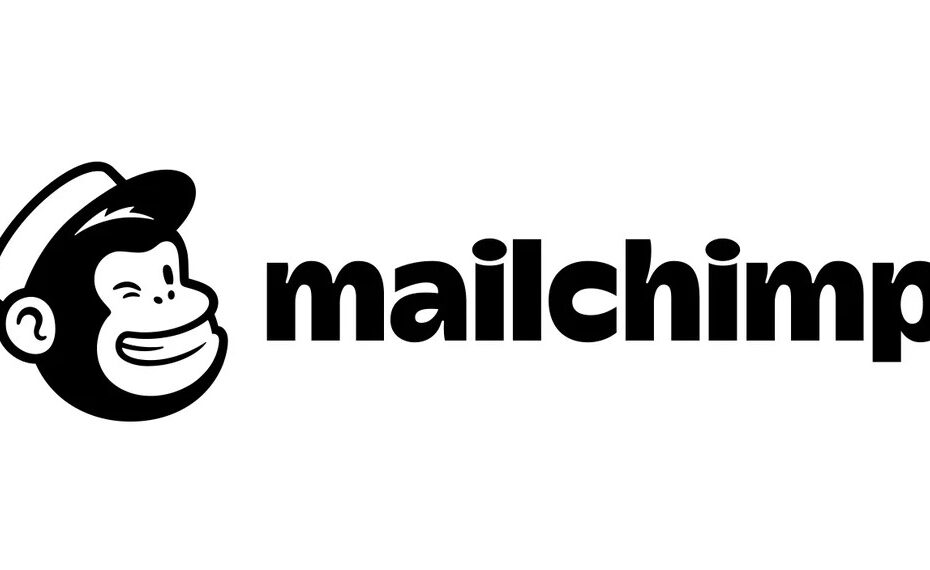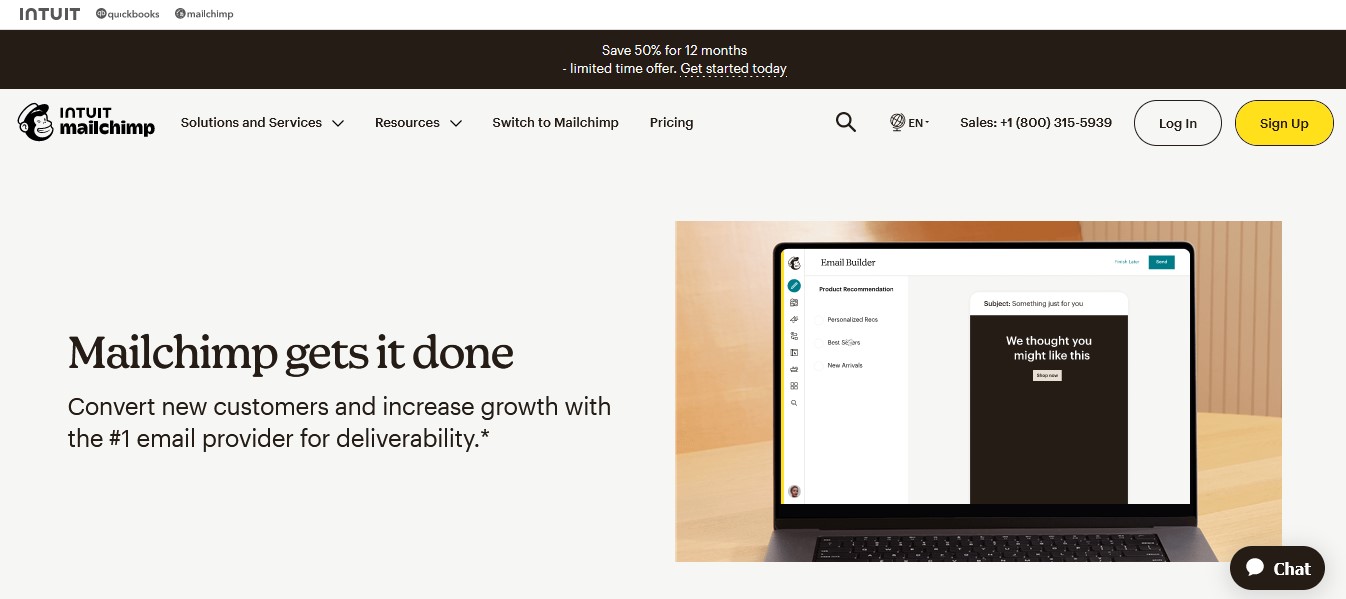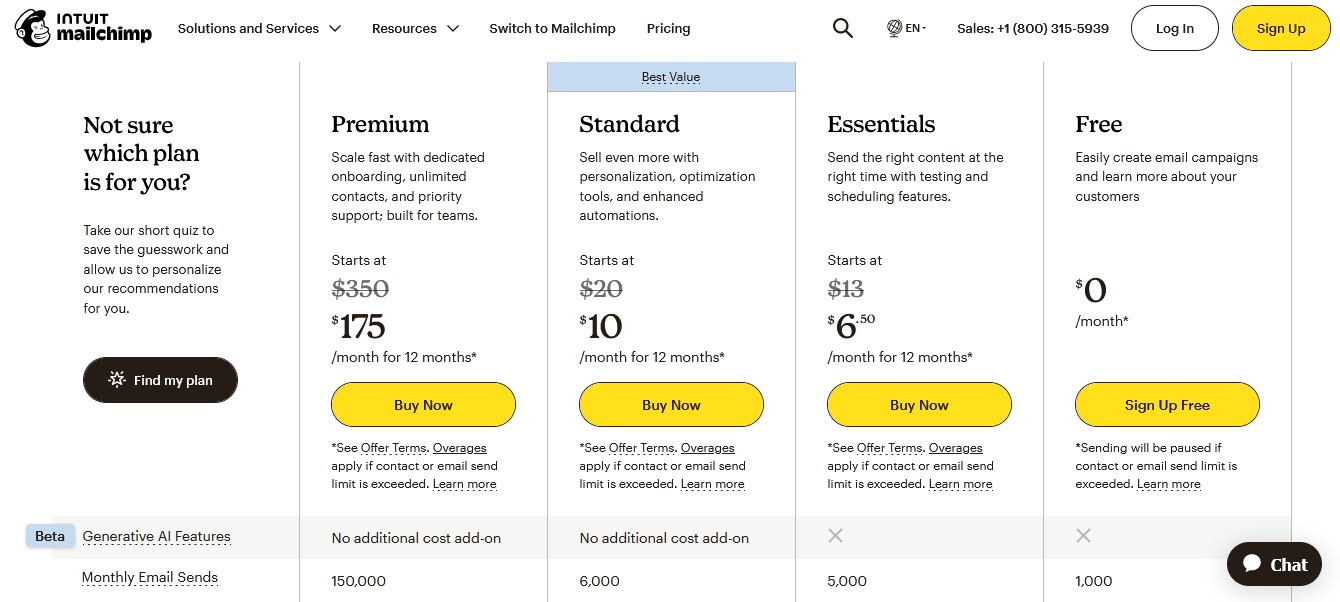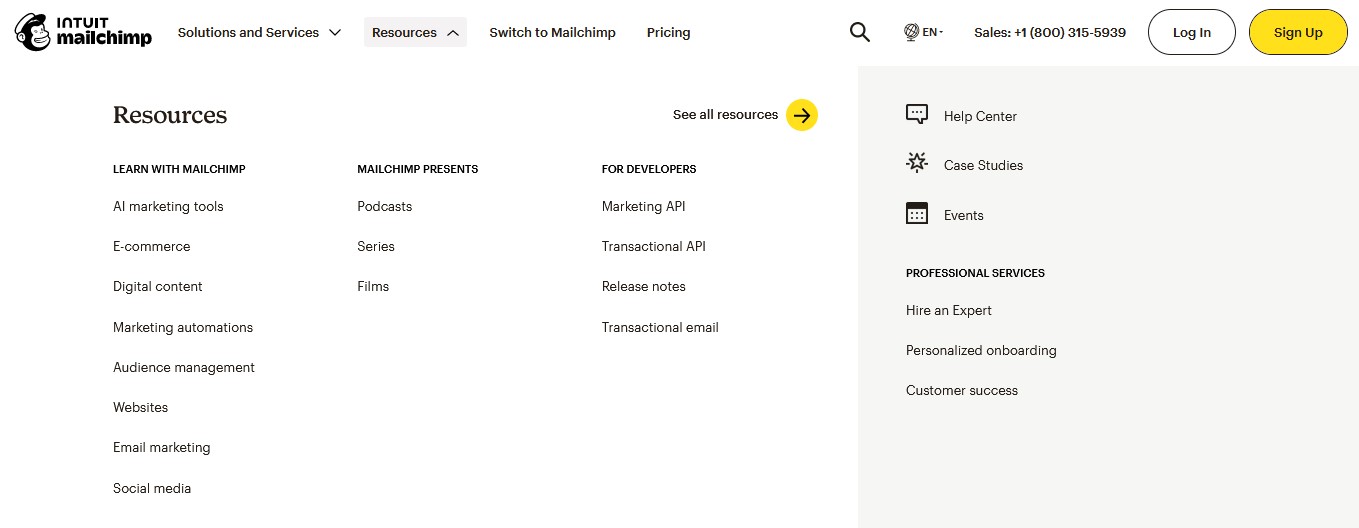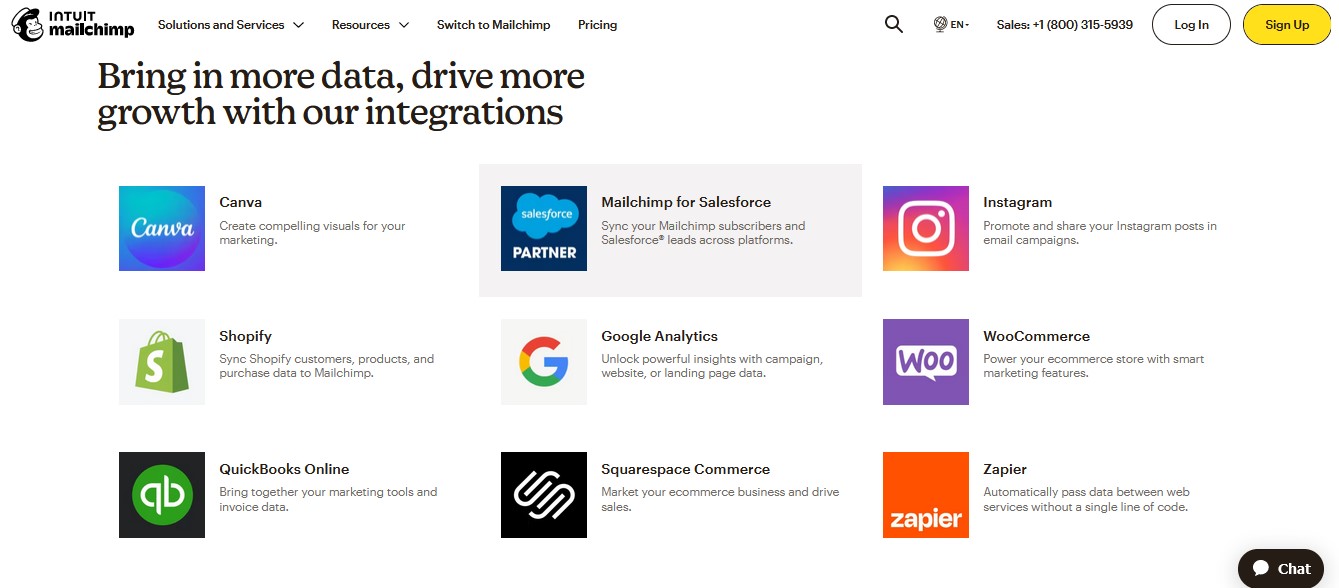As a small business owner, I have found Mailchimp to be a valuable tool for managing my marketing campaigns efficiently. The pricing structure of Mailchimp is flexible and customizable, allowing me to choose a plan that fits within my budget and scales as my business grows. The features offered by Mailchimp, such as email automation, analytics tracking, and audience segmentation, have helped me streamline my marketing efforts and reach out to customers in a more targeted way.
In researching Mailchimp reviews online, I have found that many users praise the platform for its user-friendly interface and comprehensive reporting capabilities. The positive feedback from other users has reassured me that I made the right choice in selecting Mailchimp as my CRM tool. However, it’s important to consider alternatives to Mailchimp such as HubSpot or Sendinblue which offer similar features but may better suit the specific needs of your business. Overall, exploring different options and reading reviews can help ensure you find the best CRM solution for your individual needs and goals.
In conclusion, Mailchimp’s pricing flexibility, robust features, positive reviews from users make it a top choice for small businesses looking to enhance their marketing strategies. However, it’s essential to consider alternatives based on your specific requirements before making a final decision. By thoroughly researching CRM platforms like Mailchimp and its competitors, you can find the perfect fit for your business needs and set yourself up for success in reaching your target audience effectively.
Mailchimp is a popular email marketing platform known for its user-friendly interface, robust features, and competitive pricing plans. With Mailchimp, users can create and send email campaigns, automate marketing workflows, and analyze campaign performance through detailed reports. The platform offers a range of pricing plans to suit different business needs, from a free plan for beginners to advanced plans with more features for larger organizations.
In terms of features, Mailchimp provides customizable email templates, segmentation tools to target specific audiences, A/B testing capabilities to optimize campaign performance, and integrations with other marketing tools. Users have praised Mailchimp for its ease of use and customer support, as well as its ability to help businesses grow their email lists and engage with their audience effectively. Some alternatives to Mailchimp include Constant Contact, Sendinblue, and ConvertKit, each offering unique features and pricing options that may better suit individual business needs.
Overview of Mailchimp’s email marketing platform
Mailchimp is a popular email marketing platform that offers a wide range of tools and features to help businesses create, send, and analyze email campaigns. One of the key aspects of Mailchimp is its customer relationship management (CRM) capabilities, which enable users to segment their audience based on various criteria such as purchase history, engagement levels, and demographics. This allows businesses to send more targeted and personalized emails to different segments of their audience, increasing the effectiveness of their campaigns.
In addition to CRM functionalities, Mailchimp also provides users with customizable templates for creating visually appealing emails without requiring any coding knowledge. The platform also offers A/B testing capabilities that allow users to test different versions of their emails to determine which one performs better in terms of open rates and click-through rates. Furthermore, Mailchimp’s analytics tools provide insights into campaign performance metrics such as open rates, click-through rates, bounce rates, and more, helping businesses track the success of their email campaigns and make data-driven decisions for future strategies.
Overall, Mailchimp’s email marketing platform is user-friendly yet powerful in its capabilities for businesses looking to connect with their audience through email campaigns. With its CRM features for audience segmentation, customizable templates for designing engaging emails, A/B testing functionality for optimizing campaign performance, and analytics tools for tracking results – Mailchimp provides a comprehensive solution for effective email marketing strategies.
Mailchimp is a popular email marketing platform that offers a range of tools and features to help businesses create, send, and track email campaigns. With Mailchimp, users can easily design professional-looking emails using customizable templates and drag-and-drop editing tools. The platform also provides advanced segmentation options, allowing users to target specific groups of subscribers based on their behavior or demographics.
One key feature of Mailchimp is its automation capabilities, which enable users to set up automated email campaigns triggered by specific actions or events. This helps businesses save time and maintain consistent communication with their audience. Additionally, Mailchimp offers detailed analytics and reporting tools to track the performance of email campaigns, providing valuable insights into open rates, click-through rates, and other metrics. Overall, Mailchimp’s user-friendly interface and robust features make it a popular choice for businesses looking to enhance their email marketing efforts.
Mailchimp CRM Pricing: Tiered plans and pricing options
Mailchimp offers a variety of tiered plans and pricing options for their CRM services. The pricing structure is based on the number of contacts you have in your database, with different plans catering to various business sizes and needs. The Essentials plan is suitable for small businesses and starts at $9.99 per month, allowing up to 50,000 contacts.
For larger businesses or those requiring more advanced features, the Standard and Premium plans offer additional functionalities such as advanced segmentation, A/B testing, and multivariate testing. These plans are priced higher but provide greater flexibility and customization options to meet specific marketing needs. Overall, Mailchimp’s tiered pricing system ensures that businesses of all sizes can find a plan that fits their budget while still offering a range of useful features for effective customer relationship management.
Mailchimp CRM offers a variety of tiered plans and pricing options to cater to the diverse needs of businesses. The pricing structure is designed to be flexible and scalable, allowing companies to choose a plan that best suits their budget and requirements. With different tiers offering various features and capabilities, businesses can select the plan that aligns with their specific CRM needs.
The tiered plans range from basic packages for small businesses to more advanced options for larger enterprises with complex requirements. Each tier comes with its own set of features, such as contact management, email marketing automation, and analytics tools. Businesses can easily upgrade or downgrade their plan as needed, ensuring they have access to the right tools at any given time. With transparent pricing options and no hidden fees, Mailchimp CRM provides a straightforward approach for businesses looking to enhance their customer relationship management strategies while remaining cost-effective.
In conclusion, Mailchimp CRM’s tiered plans and pricing options offer businesses the flexibility and scalability they need in managing customer relationships effectively. By providing a range of features across different price points, companies can find a plan that meets their unique needs without breaking the bank. With transparent pricing structures and easy customization options, Mailchimp CRM stands out as a reliable choice for organizations looking to optimize their CRM strategies without compromising on quality or affordability.
Mailchimp CRM Features: Key features including automation and reporting
As a small business owner, the Mailchimp CRM has been an invaluable tool in helping me streamline my marketing efforts and better connect with customers. One of the key features that I have found most useful is the automation capabilities within Mailchimp. With its automation feature, I am able to set up personalized email campaigns that are triggered based on specific customer actions or behaviors. This not only saves me time but also ensures that my marketing messages are targeted and relevant to each individual recipient.
In addition to automation, another standout feature of Mailchimp’s CRM is its robust reporting tools. The detailed analytics provided by Mailchimp allow me to track the performance of my email campaigns in real-time, giving me insights into open rates, click-through rates, and overall engagement levels. This data helps me make informed decisions about future marketing strategies and allows me to continuously optimize my campaigns for better results. Overall, Mailchimp’s CRM features have not only helped me save time but have also empowered me to make data-driven decisions that drive growth for my business.
In conclusion, as a user of Mailchimp’s CRM features such as automation and reporting, I can confidently say that it has revolutionized the way I approach marketing for my small business. The ability to automate personalized email campaigns and track their performance through detailed analytics has significantly improved both the efficiency and effectiveness of my marketing efforts. With Mailchimp’s CRM tools at my disposal, I feel more equipped than ever to engage with customers in a meaningful way and drive positive results for my business.
Mailchimp’s CRM platform offers a range of key features that can help businesses streamline their marketing efforts. One of the standout features is automation, which allows users to set up automated email campaigns based on specific triggers or actions taken by subscribers. This helps save time and ensures that the right message is delivered to the right audience at the right time.
Another important feature of Mailchimp’s CRM is its robust reporting capabilities. Users can track the performance of their email campaigns in real-time, monitor open rates, click-through rates, and other key metrics to gain insights into what is working well and where improvements can be made. This data-driven approach enables businesses to make informed decisions and optimize their marketing strategies for better results.
Mailchimp CRM Reviews: Customer feedback and ratings
Mailchimp CRM has received generally positive feedback from customers, with many praising its user-friendly interface and robust email marketing capabilities. Users appreciate the ease of creating and sending campaigns, as well as the ability to track performance metrics such as open rates and click-through rates. The platform’s integration with other tools and platforms also makes it a popular choice for businesses looking to streamline their marketing efforts.
However, some users have noted limitations in Mailchimp CRM’s customer relationship management features, particularly in terms of customization and advanced segmentation options. Others have experienced issues with deliverability and spam filters, which can impact the effectiveness of email campaigns. Overall, Mailchimp CRM is a solid choice for small to medium-sized businesses looking for an affordable and easy-to-use solution for managing their customer relationships and email marketing efforts.
As a small business owner, I understand the importance of utilizing customer relationship management (CRM) tools to streamline my communication and marketing efforts. Mailchimp CRM has been a popular choice among many entrepreneurs due to its user-friendly interface and robust features. Reading through the reviews and ratings from other users has helped me gauge the effectiveness of this tool in enhancing customer engagement and driving sales. Positive feedback highlighting Mailchimp’s automation capabilities and integration with other platforms has encouraged me to explore it further for my own business needs.
One aspect that stands out in the customer feedback is Mailchimp CRM’s ability to segment contacts effectively, allowing businesses to create targeted campaigns based on specific demographics or purchase behaviors. This level of customization can significantly improve conversion rates and overall ROI for marketing initiatives. Additionally, many reviewers praise Mailchimp’s customer support team for their responsiveness and assistance in troubleshooting any issues that may arise while using the platform. These insights provide valuable information for me as I consider incorporating Mailchimp CRM into my business operations.
Despite mostly positive reviews, some users have mentioned limitations such as pricing structures or certain features that could be improved upon. While this allows for a more holistic understanding of Mailchimp CRM’s strengths and weaknesses, it also prompts me to conduct further research before making a final decision on implementing this tool in my business strategy. Overall, analyzing customer feedback and ratings related to Mailchimp CRM has given me confidence in its capabilities while also encouraging me to ask critical questions about how it aligns with my specific business objectives and budget constraints.
Mailchimp CRM Alternatives: Comparison with other email marketing tools
As a small business owner, navigating the world of email marketing tools can be overwhelming. One popular option is Mailchimp CRM, known for its user-friendly interface and robust features. However, it’s important to explore alternatives to ensure you’re getting the best tool for your specific needs. One key comparison point is CRM integration – while Mailchimp offers basic CRM functionality, other tools like HubSpot and ActiveCampaign provide more advanced customer relationship management capabilities.
In addition to CRM integration, pricing is another crucial factor when comparing email marketing tools. While Mailchimp offers a free plan with limited features and scaling options based on subscriber count, some alternatives may offer more competitive pricing structures or include additional features at lower price points. For example, ConvertKit focuses specifically on creators and bloggers with a simple pricing model that doesn’t penalize users as their subscriber lists grow. Ultimately, the decision between Mailchimp CRM and its alternatives comes down to your specific business needs and budget constraints.
In conclusion, while Mailchimp CRM has been a popular choice for many businesses due to its ease of use and wide range of features, it’s important to consider alternative email marketing tools that may better suit your unique requirements. Whether you prioritize advanced CRM functionality or affordable pricing plans, exploring options like HubSpot, ActiveCampaign, or ConvertKit can help you make an informed decision about which tool will best support your email marketing efforts in the long run.
Conclusion
In conclusion, Mailchimp stands out as a comprehensive email marketing platform that caters to businesses of all sizes. Its pricing structure offers flexibility and scalability, allowing users to choose the plan that best suits their needs and budget. The wide range of features provided by Mailchimp, including automation tools, audience segmentation options, and detailed analytics, make it a powerful tool for executing successful email campaigns.
When looking at reviews from current users, it’s clear that Mailchimp’s user-friendly interface and extensive support resources are highly appreciated. However, some users have expressed concerns about the cost of the platform compared to its competitors. For those seeking alternatives to Mailchimp, platforms like Constant Contact and Sendinblue offer similar features at competitive price points. Ultimately, the decision on which email marketing platform to use will depend on individual business needs and preferences.
